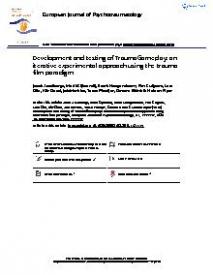Development and testing of TraumaGameplay : an iterative experimental approach using the trauma film paradigm
Background: Vivid trauma-related intrusions are a hallmark symptom of posttraumatic stress disorder (PTSD), and may be involved in its onset. Effective interventions to reduce intrusions and to potentially prevent the onset of subsequent PTSD are scarce. Studies suggest that playing the videogame Tetris, shortly after watching aversive film clips, reduces subsequent intrusions. Other studies have shown that taxing working memory (WM) while retrieving an emotional memory reduces the memory’s vividness and emotionality.
Objective: We developed TraumaGameplay (TGP), a gaming app designed to reduce intrusions. This paper describes two successive experiments to determine whether playing TGP without memory retrieval (regular TGP) or TGP with memory retrieval (dual-task TGP) reduces intrusion frequency at one week compared to a no-game control.
Method: For both experiments, healthy university students were recruited. Experiment 1: 92 participants were exposed to a trauma film and randomized to (1) regular TGP1 (n = 31), (2) dual-task TGP1 (n = 31) or (3) control (n = 30). In experiment 2, 120 healthy students were exposed to a trauma film and randomized to (1) regular TGP2 (n = 30), (2) dual-task TGP2 (n = 29), (3) recall only (n = 31) or (4) control (n = 30).
Results: We found no significant difference between conditions on the number of intrusions for either playing regular TGP or dual-task TGP in both experiment 1 and experiment 2.
Conclusion: Our results could not replicate earlier promising findings from preceding experimental research. Several reasons may underpin this difference ranging from the visuospatial videogame used in our experiments to the method of the experiment to the difficulties of replicability in general.
In: European Journal of Psychotraumatology, ISSN 2000-8198 ; eISSN 2000-8066 | 9 | 1 | 1424447
https://doi.org/10.1080/20008198.2018.1424447


